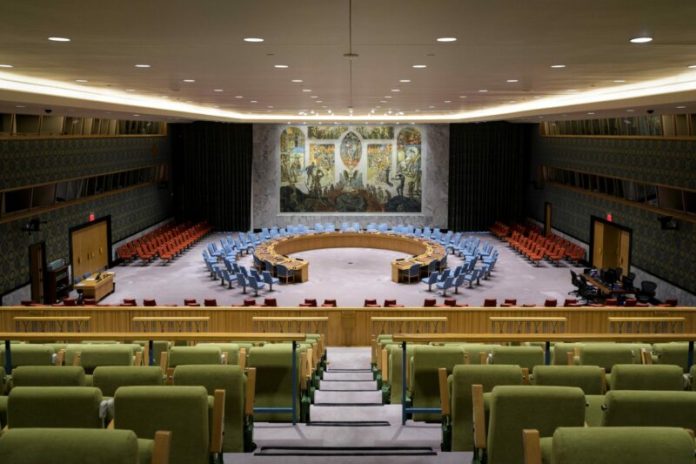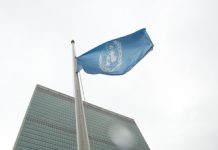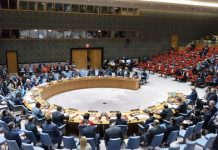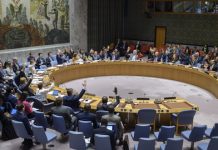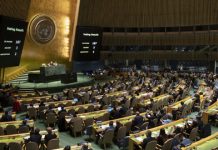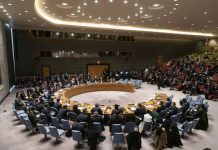“I started feeling very idealistic about the UN, and I’ve never lost that feeling,” Mr. Stewart told UN News in an exclusive interview.
In early August, he steps down as the Special Representative of the Secretary-General and head of the UN Peacekeeping Force in Cyprus (UNFICYP).
His departure comes at a moment of cautious optimism on the island. Just last week, the Secretary-General reported that talks between the Greek Cypriot and Turkish Cypriot leaders were “constructive”, with “common understanding” on new initiatives.
Mr. Stewart called the talks “an important step” in maintaining momentum.
“We are at a bit of a challenging moment for Cyprus because of upcoming elections in the north and other dynamics,” he explained. “The intent was to keep the ball rolling and keep the momentum going, and I think that succeeded.”
Peace by preventing sparks
Looking back at his tenure in Cyprus, Mr. Stewart likened UNFICYP’s daily work to stamping out sparks before they ignite.
“There are all sorts of activities happening in the buffer zone every day, each with the potential to escalate,” he said. “Our job is to prevent those sparks from bursting into flames. When I report to the Security Council that things are calm, it means we have been successful.”
Our job is to prevent sparks from bursting into flames. When I report to the Security Council that things are calm, it means we have been successful.
The numbers bear out his point: in more than half a century of UN peacekeeping on the island, not a single shot has been fired between the two militaries.
“Some people ask why the peacekeeping mission is still needed, given that it’s been peaceful for 50 years…the answer is simple – it’s peaceful because the mission has been doing its job. Without it, the deep mistrust between the sides could easily spiral into confrontation.”
Lessons on trust and empathy
Mr. Stewart also served as the Special Adviser on Cyprus, leading the Secretary-General’s good offices to support a comprehensive settlement. The greatest obstacle, he said, lies not in public sentiment but in political will.
“The people get along fine,” he noted. “Millions cross from one side to the other every year without incident. But among political leaders, distrust runs so deep that even the idea of compromise is viewed negatively.”
This distrust, he said, is rooted in decades of hardline narratives that portray the other side as an enemy rather than a partner. Breaking those narratives is essential.
“Peacebuilding requires not just negotiation but a willingness to dismantle these rigid narratives and build empathy,” he said. “And we do this all the time at an individual level. Bring two people who have each lost something in front of each other, and they can quite readily sympathise with each other and share a common grief.”
This belief in the power of empathy, he added, resonates far beyond Cyprus: in many conflicts, peace emerges when people begin to recognise the humanity – and suffering – on the other side.
Peacekeeping not one-size-fits-all
Mr. Stewart’s career has given him a panoramic view of peacekeeping’s evolution.
In Timor-Leste, he saw how UN support can help a fledgling state build resilience. In Addis Ababa, as part of the UN Office to the African Union, he witnessed the power of partnerships. And in Western Sahara, he experienced the limits of peacekeeping when a ceasefire failed to hold.
He highlighted that peacekeeping is not a one-size-fits-all mode – it is modular – “a bit of this and a bit that”, tailored to the circumstances and working with a wide range of partners.
“I guess I have lived through the evolution of peacekeeping and seen many different aspects of it, [but] I am ever more convinced that peacekeeping is an absolutely essential tool for the international community.”
A quiet exit
Now preparing for life after the UN, Mr. Stewart is clear: he has no plans to return in any advisory or consulting role.
“For me, retirement means retirement,” he said with a smile.
“I want to do all the things I’ve been postponing for my whole career – live in a house I own, spend time with my teenage son who is going to high school…that is the life that I have in mind.”
Idealism remains intact
Concluding the interview, I asked if he had any final words. As he looked around for ideas, I suggested, “maybe your first day on the job.”
He recalled his beginning in the United Nations, a journey that started with the referendum for self-determination in Timor-Leste in the 1990s, against the backdrop of intimidation, violence and a fragile security environment.
I started off feeling very idealistic about the UN, and I’ve never lost that feeling…the UN is here to do good things – the right things
“It was our watch, our responsibility to put on a free and fair vote,” he said, “and that was going to be impossible under these circumstances.” Yet, despite the odds, the Timorese vote went ahead, and the result was clear — a success against all expectations.
“That was a very heady, exciting experience to start in the UN…it started me off feeling very idealistic about the UN, and I’ve never lost that feeling that, you know, the UN is here to do good things, to do the right things.”
As he steps away from the UN, Mr. Stewart says that idealism remains intact.
“It might take time, but we will succeed…even though people get discouraged because it’s very, very hard for all kinds of reasons that are out of our control, it’s a wonderful principle to be serving. So, I leave wishing only the best for my colleagues who will continue the fight.”
Source of original article: United Nations (news.un.org). Photo credit: UN. The content of this article does not necessarily reflect the views or opinion of Global Diaspora News (www.GlobalDiasporaNews.com).
To submit your press release: (https://www.GlobalDiasporaNews.com/pr).
To advertise on Global Diaspora News: (www.GlobalDiasporaNews.com/ads).
Sign up to Global Diaspora News newsletter (https://www.GlobalDiasporaNews.com/newsletter/) to start receiving updates and opportunities directly in your email inbox for free.


